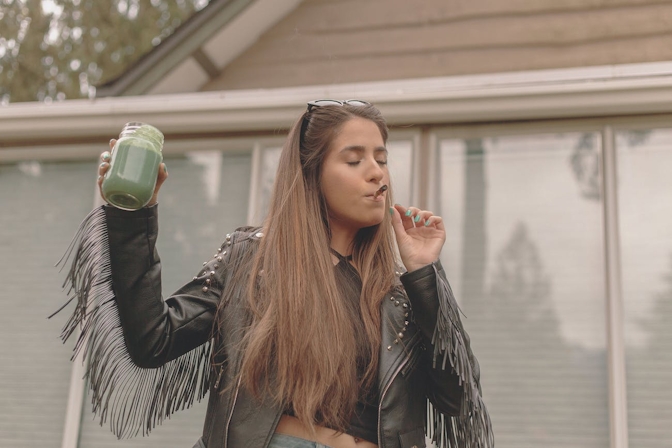
Photo by Georgia Love for Herb
What Is Bhang & How To Make It
Discover the history, effects, benefits, and how to prepare this mysterious Indian drink
There are few forms of cannabis that defy the stigma surrounding its use like bhang.
This traditional Hindu drink is not only popular among followers of Shiva in northern India but is so sacred that it is exempt from international drug laws.
Bhang is a drink of Indian origin with a fascinating and mysterious history. Often associated with religious and cultural festivals in India, Bhang has become a popular drink around the world thanks to its unique effects and benefits.
What Is Bhang?
Bhang is a drink made from cannabis and milk that originated in India thousands of years ago.
Usually consumed during religious festivals, bhang is a milky drink that comes in two basic preparations: Thandai; which is prepared with milk, sugar, almonds, and spices such as cardamom and saffron, and Lassi, which is a yogurt-based blend of spices and cannabis.
Bhang is believed to have been first mentioned in sacred Hindu texts more than 3,000 years ago. Since then, Bhang has become a popular drink throughout India, especially during religious and cultural festivals such as Holi and Shivratri.
History Of Bhang

Photo by Georgia Love for Herb
The first recorded use of bhang was discovered in the sacred Atharvaveda texts, over 3,000 years old, which form the basis of an alternative plant-based medicinal practice known as Ayurvedic medicine.
The name Bhang comes from the Sanskrit word used to describe the leaves of the cannabis plant used in the preparation of the drink. In the same language, the resin is called charas, and ganja is the smokable bud, do you recognize these names?
In modern India, where cannabis use is not as widespread as it once was, the word bhang has come to describe the drink and is considered a drink of the gods, particularly the god Shiva, who is sometimes referred to as the Lord of Bhang.
Often described as the god of destruction, Shiva is one of the three central gods of the Hindu faith and can be more accurately understood as a god of change in a constant cycle requiring creation, maintenance, and destruction.
Although the Indian Narcotic Drugs and Psychotropic Substances Act of 1985 banned cannabis as part of a global push to ban narcotics, parts of northern India were exempted from prohibition because of the importance of bhang in their religious traditions. Bhang is also consumed by followers of Krishna, in Mathura, and can be purchased legally in government-sanctioned stores in the northern regions of Guwahati, Rajasthan, Uttar Pradesh, and Kerala.
What Are The Uses Of Bhang In India?

Bhang has many uses in India. From religious to medicinal.
Religious: Bhang is an important element in many rituals, such as during the sexual acts of tantric religious yoga.
Medicinal: It is believed to be effective for the treatment of diseases like malaria, dysentery, rheumatism, fevers, etc.
It is also common to consume Bhang to calm the nerves and increase libido.
As a curious fact: Bhang is also used as an aphrodisiac for brides on their wedding night, as a hospitality gift at the reception of guests at home, and as an integral element in certain celebrations: Holi festival, Janmashtami, and Shrivratri.
Effects Of Bhang
Bhang is believed to have many of the same effects as edible cannabis. Its effects take a little while to appear but also last longer than those of smokable cannabis as it is ingested. Some have reported feelings of claustrophobia and anxiety and a high that can last most of the day.
Other effects include distorted perception of time, dizziness, memory loss, increased appetite, and laughing at absolutely everything.
The intensity of bhang has led some to believe that it is forbidden for mortals to drink it and that only Shiva can withstand its effects. Others consume bhang as an offering to Shiva, while today many drink it as a celebratory beverage.
Bhang is known to have psychoactive effects that can last for several hours. Common effects of bhang include feelings of euphoria, relaxation, creativity, and increased sensitivity to visual and auditory stimuli.
Benefits Of Bhang

Photography by Georgia Love for Herb
Like its physical and psychological effects, many of the medicinal benefits of bhang are similar to those of cannabis in its other forms.
Some use bhang to relieve anxiety, treat glaucoma, balance hypertension, as an appetite stimulant, and even as an aphrodisiac.
Bhang has also been traditionally used in Ayurvedic medicine to treat a variety of ailments, including headache, menstrual pain, stomach pain, and fever. In addition, Bhang is believed to have anti-inflammatory and antioxidant properties.
How To Prepare Bhang?
Ingredients:
2 cups of water
4 grams of fresh cannabis flowers (preferably rich in CBD)
4 grams of cannabis leaves
3 cups of warm milk
½ cup sugar
1 tablespoon coconut milk
1 tablespoon of crushed almonds
½ teaspoon of ginger powder
Pinch of Garam Masala
1 teaspoon grenadine
Preparation of the Bhang:
Boil water in a saucepan
Add the cannabis
Bring it to a simmer and let it cook for about 10 minutes
Remove the saucepan from the heat and add two tablespoons of milk. Stir the mixture.
Keep adding the milk along with the almonds and stir it repeatedly
Strain the mixture to remove the woody remains of the cannabis and pour it into a bowl
Add the rest of the milk, coconut milk, grenadine, and boiled water
Mix it all while adding the ginger, sugar, and garam masala
Chill in the refrigerator for a couple of hours before serving
Enjoy this mystical drink!
Herb Recommended Products:
READ MORE










